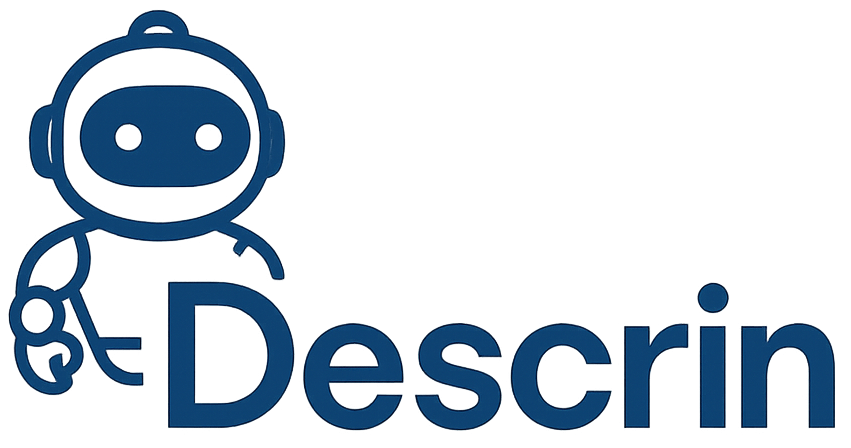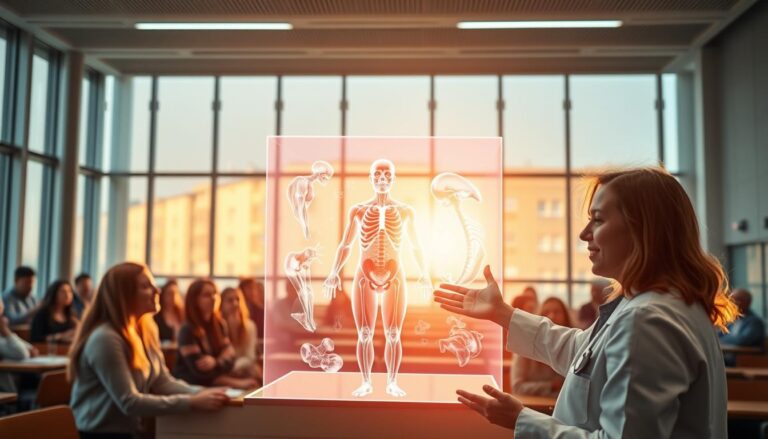AI Integration in Top German Engineering Universities
When you look into engineering education in Germany, you’ll see a big change. Top universities are using AI integration to shape the future of tech and innovation.

Leaders like the Technical University of Munich (TUM) and RWTH Aachen University are leading this change. They are at the forefront of AI-driven research and education.
By adding AI to their classes and research, these universities are making learning better. They are also creating cutting-edge innovations.
Table of Contents
The Current State of AI in German Engineering Education
German engineering education has a rich history. Now, it’s being transformed by AI. Today, it combines traditional engineering with modern digital technologies.
Historical Context of Engineering Excellence in Germany
Germany is known for its engineering excellence. Schools like the Technical University of Munich (TUM) and RWTH Aachen University are at the forefront. They produce skilled engineers who lead in innovation.
The engineering culture in Germany values precision, innovation, and practical use. AI and machine learning are now adding to this foundation. This prepares students for the digital age.
The Digital Transformation Imperative
German engineering universities are adapting to the digital age. They’re adding AI to their courses and research. This means teaching AI and applying it to real engineering problems.
| University | AI Focus Areas | Industry Collaborations |
|---|---|---|
| TUM | Machine Learning, Robotics | Siemens, BMW |
| RWTH Aachen | AI for Manufacturing, Autonomous Systems | Volkswagen, Bosch |
German engineering universities are embracing AI and digital transformation. They’re preparing students for a rapidly changing world.
AI Integration in Top German Engineering Universities
Top German engineering universities are leading the way in AI integration. They’re changing how engineering is taught and researched. You’re about to see how these schools are adding artificial intelligence courses and updating their programs to encourage innovation and tech growth.
Defining Modern AI Integration in Academic Settings
Modern AI integration in schools is more than just adding AI courses. It’s about using AI in all parts of engineering education. This includes research, partnerships with industries, and studying across different fields. It’s a move towards a more complete education that prepares students for today’s tech world.
Universities are setting up AI-driven research centers to work with companies on real problems. This not only makes learning better but also gives students hands-on AI skills.
Germany’s Strategic Approach to AI Education
Germany’s plan for AI education focuses on teamwork and partnerships with industries. The government and top schools are teaming up to build a strong AI education and research system. They’re investing in AI labs and facilities.
| University | AI Focus Areas | Industry Partnerships |
|---|---|---|
| Technical University of Munich (TUM) | Machine Learning, Robotics | Siemens, BMW |
| RWTH Aachen University | AI in Manufacturing, Autonomous Systems | Volkswagen, Google |
| Karlsruhe Institute of Technology (KIT) | AI for Energy Systems, Robotics | EnBW, Siemens |
A recent report says, “Germany is becoming a world leader in AI education through teamwork between schools, companies, and government.” This approach is making AI education better and helping Germany rank high in German universities rankings AI integration.
Technical University of Munich (TUM): Leading the AI Revolution
The Technical University of Munich (TUM) is at the forefront of AI education and research. It sets a new standard for engineering universities. TUM is a hub for innovation, offering a wide range of AI programs, research centers, and partnerships with industry.
Pioneering AI Programs and Research Centers
TUM’s AI programs are designed to prepare students for complex AI challenges. The university’s research centers lead in AI innovation. They work with industry partners to create real-world applications.
Key Research Areas:
- Machine Learning
- Deep Learning
- Computer Vision
- Robotics
Machine Learning and Deep Learning Specializations
TUM offers specialized courses in machine learning and deep learning. These courses give students a deep understanding of AI algorithms and their applications. They are designed to meet the growing demand for AI experts.
| Specialization | Key Topics | Career Outcomes |
|---|---|---|
| Machine Learning | Supervised and Unsupervised Learning, Neural Networks | Data Scientist, AI Engineer |
| Deep Learning | Convolutional Neural Networks, Recurrent Neural Networks | AI Researcher, Deep Learning Engineer |
Industry Partnerships and Real-World Applications
TUM’s industry partnerships allow students to work on real-world projects. They apply their knowledge to develop innovative AI solutions. This collaboration between academia and industry makes TUM’s AI programs relevant and effective.
By integrating AI into its engineering programs, TUM prepares the next generation of engineers. They are ready to lead the AI revolution. With a focus on innovation and real-world applications, TUM is the perfect place for students to make a difference in AI.
RWTH Aachen University: Blending Traditional Engineering with AI
At RWTH Aachen University, you’ll see how traditional engineering meets AI. This top school is a great example of anengineering school in Germany embracing digital change.
Innovative Curriculum Integration Strategies
RWTH Aachen University has made AI a key part of its engineering courses. It offers classes that mix computer science and engineering. This way, students learn how AI works in real engineering projects.
Research Breakthroughs in AI and Robotics
The university is leading in research breakthroughs in AI and robotics. Its faculty and students are exploring new frontiers in these areas. With top-notch facilities, they’re creating advanced AI and robotics technologies.
Student Projects and Competitions
Students at RWTH Aachen University get to work on projects and compete in challenges. They can use their AI and engineering skills to solve real problems. This helps build a culture of innovation and entrepreneurship.
By studying at RWTH Aachen University, you join a community that’s shaping engineering and AI’s future. With its focus on teamwork and innovation, it’s a top pick for those seekingcomputer science degrees in Germany.
Karlsruhe Institute of Technology (KIT): AI Research Excellence
The Karlsruhe Institute of Technology (KIT) leads in AI research. It combines deep learning with real-world use. You’ll find many resources here to help advance AI.
Specialized AI Laboratories and Facilities
KIT has specialized AI laboratories and facilities. These give students and researchers hands-on tech experience. The labs have the latest tools for creating new AI solutions.
Robotics and Autonomous Systems Research
KIT is known for its work in robotics and autonomous systems. The team works on projects that expand AI’s limits. They focus on smart robots and self-driving cars, leading to new innovations.
Student Opportunities and Success Stories
Students at KIT get many chances to work with AI. They can join research projects, internships, and entrepreneurship programs. Many KIT graduates have made big names in AI, showing the institute’s top AI education.
University of Stuttgart: Interdisciplinary AI Applications
The University of Stuttgart is known for its innovative AI research. It brings together AI from different fields, making it better at solving big problems.
Cross-Departmental AI Initiatives
The university supports AI projects across departments. This teamwork helps create AI solutions for many areas. For example, AI is used in engineering, natural sciences, and humanities to spark new ideas.

Simulation and Modeling Innovations
The university excels in simulation and modeling, thanks to AI. AI algorithms help make detailed models that mimic real-life situations. This helps with predictions and making decisions. These breakthroughs are important for engineering and environmental science.
| Department | AI Application | Research Focus |
|---|---|---|
| Engineering | Predictive Maintenance | Machine Learning |
| Natural Sciences | Climate Modeling | Deep Learning |
| Humanities | Text Analysis | Natural Language Processing |
The University of Stuttgart leads in digital transformation in education by using AI across departments. This method improves research quality and gets students ready for an AI-filled future.
TU Berlin: Urban AI Solutions and Smart City Research
The Technical University of Berlin is leading the way in using AI for city planning. It’s making cities better for the future. TU Berlin is a top school in Germany for AI research. It’s working on new ways to solve city problems.
AI for Sustainable Urban Development
TU Berlin is using AI to make cities better for the environment. The university is working on projects that improve city life. This includes smarter traffic systems and energy-saving buildings.
By using AI, TU Berlin is making cities more friendly and green.
Collaborative Projects with Berlin’s Tech Ecosystem
TU Berlin is teaming up with Berlin’s tech scene to boost AI innovation. These partnerships help the university stay ahead in AI research. They also give students a chance to work on real projects.
By working with tech companies and startups, TU Berlin is creating a culture of innovation. This is changing the face of cities.
Machine Learning and Robotics Research Advancements
Get ready to explore the exciting world of machine learning and robotics research in German universities. These places are leading the way with AI in engineering. They’ve made huge leaps in these areas.
Cutting-Edge Machine Learning Projects
Top German engineering universities are working on cool machine learning projects. They cover topics like computer vision, natural language processing, and predictive analytics. For example, they’re creating algorithms that help machines understand complex data. This is leading to new ideas in healthcare and finance.

Robotics Innovation Centers and Facilities
Germany’s engineering schools have amazing robotics centers. These places let students and researchers get their hands dirty with robotic projects. They have top-notch tools, creating a space where everyone can work together and innovate.
International Research Collaborations
German universities are teaming up with others worldwide to push the boundaries of machine learning and robotics. These partnerships help share knowledge and spark new ideas. Here are some examples:
| University | Collaborating Institution | Research Focus |
|---|---|---|
| Technical University of Munich (TUM) | Massachusetts Institute of Technology (MIT) | AI for Robotics |
| RWTH Aachen University | University of Cambridge | Machine Learning for Healthcare |
| Karlsruhe Institute of Technology (KIT) | Stanford University | Autonomous Systems |
These partnerships show Germany’s dedication to top-notch technology programs. They make German universities a top choice for students and researchers from around the world.
Opportunities for International Students in German AI Programs
Germany’s engineering universities are known for their top AI programs. They offer a mix of academic excellence, innovative research, and cultural diversity. This makes Germany a great choice for students from around the world.
Germany’s leading universities have AI programs for international students. These programs give a deep education in artificial intelligence and its uses.
Admission Requirements and Application Process
To get into AI programs in Germany, you need a bachelor’s degree in a field like computer science or engineering. You’ll need to send in your academic records, letters of recommendation, and a personal statement. This statement should talk about your research interests and career goals.
- Check the specific admission requirements for your chosen program.
- Ensure your academic credentials are recognized by the German university.
- Prepare a strong personal statement and secure letters of recommendation.
Scholarships and Funding Options
Germany has many scholarships and funding options for international students. You can look into government-funded scholarships, like those from the DAAD, and university-specific funding.
Key funding opportunities include:
- DAAD Scholarships
- University scholarships
- Research grants
Language Requirements and English-Taught Programs
Many AI programs in Germany are taught in English. This is to help international students. You’ll need to show you’re good at English, usually with TOEFL or IELTS tests.
Student Life and Support Systems
Germany’s universities have lots of support for international students. They help with finding a place to live, language courses, and getting used to the culture.
Career Prospects After Studying AI at German Universities
Studying AI in Germany can really boost your career. Germany’s engineering schools lead in AI research and education. This gives you a big advantage in the job market.
Industry Demand for AI-Trained Engineers
The need for AI-trained engineers is growing fast. This is true in fields like cars, making things, finance, and health. Top German engineering universities produce graduates that top companies want. You’ll find jobs in:
- Creating AI solutions for different industries
- Working on advanced robotics and self-driving systems
- Using machine learning to solve real-world issues
Startup Opportunities and Innovation Ecosystem
Germany is full of startup support, with many incubators and accelerators for AI projects. You can use this to make your ideas into real startups. Universities also offer help and guidance to start your journey.

Salary Expectations and Job Market Analysis
AI graduates in Germany can earn good money. AI professionals in Germany are among the best paid in tech. The job market shows a strong need for skilled AI engineers. There are many chances for growth and learning.
Conclusion: The Future of AI in German Engineering Education
Exploring AI in top German engineering universities shows a bright future. Schools like the Technical University of Munich and RWTH Aachen University lead in AI research and education. They are making big strides in innovation and entrepreneurship.
The digital transformation in education will boost AI in these universities. This will make them even stronger in the german universities rankings ai integration. You can look forward to more AI advancements, including machine learning, deep learning, robotics, and autonomous systems.
AI is changing the engineering world, offering new chances for growth. By studying AI at German universities, you’ll be ready to tackle this new landscape. You’ll help drive the progress of AI-driven industries.
FAQ
What are the top German engineering universities for AI integration?
The top German engineering universities for AI integration include the Technical University of Munich (TUM), RWTH Aachen University, and Karlsruhe Institute of Technology (KIT). Also, University of Stuttgart and TU Berlin are notable. They offer AI programs, research centers, and partnerships with industries.
What kind of AI programs are offered at German universities?
German universities provide a range of AI programs. These include specializations in machine learning and deep learning. They also offer robotics and autonomous systems research. Plus, computer science degrees with a focus on AI, giving students a solid education in AI and its uses.
Are there opportunities for international students to study AI in Germany?
Yes, international students can study AI in Germany. Many universities have English-taught AI programs. There are also scholarships and funding options available, making it easier for international students to join.
What are the career prospects after studying AI at a German university?
Studying AI at a German university opens up great career opportunities. There’s a high demand for AI-trained engineers in various industries. You can also find startup opportunities and enjoy competitive salaries. Germany’s innovation ecosystem is thriving.
How do German universities support students in their AI studies?
German universities support AI students with top facilities and research projects. They offer internships and entrepreneurship programs. There’s also a wide range of student life and support systems, ensuring students have everything they need to succeed.
What is the focus of AI research in German universities?
AI research in German universities focuses on advanced projects. These include machine learning, robotics, and autonomous systems. There’s a strong emphasis on teamwork and partnerships with industries, driving innovation and entrepreneurship in AI.







